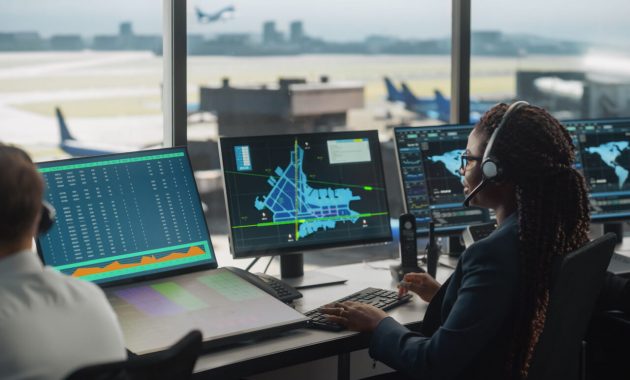
Air traffic controllers play one of the most vital roles in aviation — ensuring that aircraft take off, fly, and land safely. This high-pressure yet rewarding career demands exceptional focus, quick decision-making, and clear communication.
If you’ve ever admired the coordination behind air travel and wondered how to become an air traffic controller, this guide will walk you through the job responsibilities, required qualifications, and what it takes to succeed in this challenging profession.
1. What Does an Air Traffic Controller Do?
Air traffic controllers manage the movement of aircraft both in the air and on the ground. Their main goal is to maintain safe distances between planes and prevent collisions.
Key Responsibilities Include:
- Monitoring and directing aircraft using radar and visual signals
- Managing takeoffs, landings, and flight paths
- Communicating with pilots and ground crew
- Issuing weather updates and route changes
- Coordinating with other control towers and aviation departments
There are different types of air traffic controllers:
- Tower Controllers: Manage aircraft movements on runways and taxiways.
- Approach Controllers: Handle aircraft as they approach or depart airports.
- En Route Controllers: Monitor aircraft between airports during flight.
2. Required Education and Training
Becoming an air traffic controller typically requires specialized education and certification.
Steps to Follow:
- Earn a Bachelor’s Degree — Preferably in aviation, air traffic management, or a related field.
- Attend an FAA-Approved Program (for the U.S.) — Many countries have similar civil aviation authority-approved schools.
- Pass a Pre-Employment Test — Assessing your analytical and decision-making abilities.
- Complete Specialized Training — Candidates undergo months of intensive instruction at aviation academies.
- Obtain Certification — After training, controllers must earn an air traffic control license or certification.
3. Essential Skills for Air Traffic Controllers
To succeed in this demanding role, you’ll need a unique blend of cognitive and interpersonal skills.
Core Skills Include:
- Multitasking: Managing multiple aircraft at once
- Communication: Clear, concise, and calm under pressure
- Decision-Making: Making split-second calls that impact safety
- Situational Awareness: Understanding airspace dynamics in real-time
- Problem-Solving: Handling unexpected events or emergencies effectively
4. Work Environment and Schedule
Air traffic controllers typically work in airport control towers, area control centers, or approach control facilities.
Work Conditions:
- Highly structured, fast-paced, and high-stakes environment
- Shifts include nights, weekends, and holidays
- Often involves teamwork and continuous communication with pilots and other controllers
Despite the pressure, controllers find deep satisfaction in their crucial role in aviation safety.
5. Salary and Career Outlook
Average Salary:
- United States: $125,000 per year
- United Kingdom: £60,000 per year
- Australia: AUD 140,000 per year
- Asia (average): Varies by experience and airport size, ranging from $40,000–$100,000 annually
Career Growth:
With experience, controllers can advance to senior positions such as:
- Area Supervisor
- Chief Controller
- Air Traffic Management Specialist
- Training Instructor
The demand for qualified controllers remains stable due to aviation safety regulations and global air travel growth.
6. Challenges of Being an Air Traffic Controller
While rewarding, the role is also mentally demanding. Common challenges include:
- High stress from managing flight safety
- Long or irregular hours
- Continuous attention and zero tolerance for error
However, strong training and teamwork support help controllers maintain performance and manage pressure effectively.
7. Steps on How to Become an Air Traffic Controller
Here’s a quick summary of your path:
- Complete your education (preferably a degree in aviation).
- Pass the entrance tests required by your country’s aviation authority.
- Complete training at an approved institution.
- Earn certification or licensing.
- Start as a junior controller and gain experience.
- Advance to higher levels through performance and training.
FAQs About How to Become an Air Traffic Controller
What qualifications do I need to become an air traffic controller?
You typically need a degree in aviation or a related field, along with certification from a recognized aviation authority.
How long does it take to become an air traffic controller?
It usually takes 3–5 years, including education, testing, and on-the-job training.
Is the job stressful?
Yes, it can be, but training and teamwork prepare you to handle high-pressure situations effectively.
Can I become an air traffic controller without a degree?
Some countries allow it with relevant experience and training, but most prefer candidates with formal education.
What’s the average retirement age for air traffic controllers?
Typically between 55 and 60, depending on local regulations due to the job’s mental demands.
Are there opportunities to work internationally?
Yes, with additional licensing and language proficiency, especially in English.
What is the most important skill for an air traffic controller?
Clear communication and quick decision-making are crucial for maintaining safety.
Do air traffic controllers work night shifts?
Yes, since airports operate 24/7, controllers rotate through different shifts.
Is it hard to get a job as an air traffic controller?
It’s competitive due to strict entry tests, but consistent preparation greatly improves your chances.
Can air traffic controllers work remotely?
No, the job requires physical presence in control towers or radar facilities.
What subjects should I study in school to prepare?
Focus on math, physics, geography, and communication skills.
Do air traffic controllers receive continuous training?
Yes, ongoing training and simulations are mandatory to maintain certification.
Verdict: A High-Stakes Career Worth Pursuing
Learning how to become an air traffic controller opens the door to a challenging and prestigious career. While the path demands discipline, precision, and resilience, the reward is a vital role in ensuring global aviation safety. If you’re drawn to dynamic environments and thrive under pressure, this could be the perfect sky-high career for you.

Experienced Recruiter with a demonstrated history of working in the media production industry. Strong human resources professional with a Bachelor’s degree focused in Psychology from Universitas Kristen Satya Wacana.